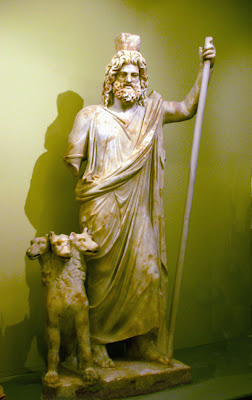HODIE: pridie Kalendas Iunias. You can add a Roman calendar as a widget in your blog or webpage, or display it as a Google Calendar: here's how.
VERBUM HODIERNUM: Today's word is EQUUS - read a brief essay about the word at my new Verbosum blog. Plus, I did today's vocabulary challenge, with these words: primus - sanctus - arripio - aetas - ex. Try to put those words into a sentence yourself... and then see what I came up with.
MORE FABLES: Here are today's fables from the Ictibus Felicibus project. These fables ALL have long marks, plus stress marks for easy reading, and the poems have meter marks, too, along with an easy-to-read prose presentation of the story:
- Agricola et Asini, the story of a man who met his death in a wagon pulled by donkeys.
- Galerita, a wonderful aetiological story about how the crested lark got its crest (a story sometimes told also about the crested hoopoe).
- Agricola et Aquila, an eagle shows its gratitude to a good-hearted man.
- Hercules et Minerva, Athena teaches Heracles a lesson in self-control.
- Leo, Lupus et Umbra Eius, a story about a wolf with an inflated sense of self.
Lupus in dēserta loca pererrāns, dum iam sōl in occāsum vergeret, cum suī umbram valdē longam animadvertisset, Leōnem, inquit, egō timeō, cum tantus sim, ut iūgerum aequem? Nonne prorsus in cēterās ferās omnēs imperium exercēbō? Dum haec Lupus superbē sēcum cōgitat, Leo supervēnit, eumque dictō citius dēvorāvit. Quapropter Lupus paenitentiā, sed frustrā tactus, exclāmābat: Ō stulta opīnio, quae meae necis causa es!TODAY'S MOTTOES & PROVERBS: You can get access to ALL the "proverb of the day scripts" (also available as random proverb scripts) at the SchoolhouseWidgets.com website.
3-Word Mottoes: Today's 3-word motto is Mirandum naturae opus (English: We should marvel at the works of nature).
3-Word Proverbs: Today's 3-word proverb is Separa et impera (English: Divide and conquer).
Rhyming Proverbs: Today's proverb with rhyme is: Quae pro parte nocent, plurima saepe docent. (English: Things which do their share of harm often teach many things - a saying about the school of "hard knocks" as we say!).
Vulgate Verse: Today's verse is Veritas liberabit vos (John 8:32). For a translation, check out the polyglot Bible, in English, Hebrew, Latin and Greek, at the Sacred Texts Archive online.
Elizabethan Proverb Commentary: Here is today's proverb commentary, this time by Taverner: Canis vindictam: A dogge hath a day. There is none so vile nor simple a person, but at one time or other may avenge him self of wronges done unto him. Wherfore it is a wise mans part to contemne no man.
Today's Poem: Today's poem is one of those paradoxical delights by Owen (4.112), with a word list at NoDictionaries.com:
Nascitur in certam miserandus homuncio mortem,English: "The pitiable little manikin is born for certain death, like a scrawny cow in the field who eats in order to be eaten." Unfortunately, there's nothing in English nearly as good as that Latin homuncio!
Ut macer in campo || bos, ut edatur, edit.
Today's image is an illustration showing Hercules together with Athena - not exactly an illustration for the fable Hercules et Minerva, but I thought it was a wonderful image!



































